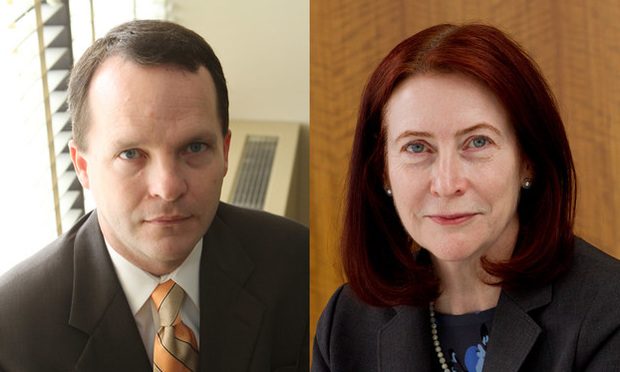High Court Ponders Fate of Litigation Funding
The Georgia Supreme Court has been asked to decide whether litigation funding agreements amount to illegally high interest loans or investment contracts that reward risk—and industry groups are watching and filing amicus briefs in support of the practice.
May 09, 2018 at 01:59 PM
3 minute read

The Georgia Supreme Court has been asked to decide whether litigation funding agreements amount to illegally high interest loans or investment contracts that reward risk.
Industry groups are focused on the outcome, having filed amicus briefs in support of the litigation funding company being sued.
“It's a monstrous industry,” Darren Summerville of the Summerville Firm told the high court during oral arguments Monday.
Summerville represents Ronald Ruth, Kimberly Oglesby and a potential class of others in the same situation. They were hurt in car crashes and needed money while they waited for their claims to be settled. They hired a lawyer who had them sign powers of attorney, which he used to enter into agreements with Cherokee Funding. Ruth and Oglesby said in their lawsuit they never saw the agreement or had it explained to them.
Ruth received $5,300 for living expenses until his claim settled, after which Cherokee demanded $84,000, according to the lawsuit. Oglesby received $400. When her claim was paid, Cherokee deducted $1,000. Ruth and Oglesby said Cherokee charged a “monthly use fee” of 4.99 percent and compounded that and other add-ons for an annual rate of 80 percent.
“It's illegal, because it's too high an interest rate,” Summerville said.
Representing Cherokee, Laurie Webb Daniel of Holland & Knight argued that the cash advances are not loans at all because they carry no guarantee of repayment. If the claim fails to bring a settlement, Cherokee cannot collect. Instead, she said, the arrangements are high-risk investments that carry a return “due to the inherent uncertainty of litigation.”
But then Daniel accidentally called the deals loans herself. “Excuse me, funding,” she added.
She quickly picked up a point Justice David Nahmias had made earlier in a question: It doesn't matter what the parties call them; they're either loans or not, contracts or not.
That's the question for the justices, who will have to either reverse or affirm a decision by the Georgia Court of Appeals saying the litigation advances are investment contracts and overruling a trial judge who said they were high interest loans.
If Summerville wins, the case will go to trial in Chatham County. “Given the array of artifices that might cleverly camouflage illegal interest, the issue is traditionally one for a jury, and certainly not subject to a motion to dismiss,” Summerville said in his brief.
If Daniel wins the point, the case likely would be tossed—an outcome that would reflect what other courts have done, she said in her brief: “Litigation funding agreements would 'not be void as usurious' because 'there was no guarantee of repayment.'”
The case is Ruth v. Cherokee Funding, No. S17G2021.
This content has been archived. It is available through our partners, LexisNexis® and Bloomberg Law.
To view this content, please continue to their sites.
Not a Lexis Subscriber?
Subscribe Now
Not a Bloomberg Law Subscriber?
Subscribe Now
NOT FOR REPRINT
© 2025 ALM Global, LLC, All Rights Reserved. Request academic re-use from www.copyright.com. All other uses, submit a request to [email protected]. For more information visit Asset & Logo Licensing.
You Might Like
View All

Evidence Explained: Prevailing Attorney Outlines Successful Defense in Inmate Death Case


Trending Stories
- 1No Two Wildfires Alike: Lawyers Take Different Legal Strategies in California
- 2Poop-Themed Dog Toy OK as Parody, but Still Tarnished Jack Daniel’s Brand, Court Says
- 3Meet the New President of NY's Association of Trial Court Jurists
- 4Lawyers' Phones Are Ringing: What Should Employers Do If ICE Raids Their Business?
- 5Freshfields Hires Ex-SEC Corporate Finance Director in Silicon Valley
Who Got The Work
J. Brugh Lower of Gibbons has entered an appearance for industrial equipment supplier Devco Corporation in a pending trademark infringement lawsuit. The suit, accusing the defendant of selling knock-off Graco products, was filed Dec. 18 in New Jersey District Court by Rivkin Radler on behalf of Graco Inc. and Graco Minnesota. The case, assigned to U.S. District Judge Zahid N. Quraishi, is 3:24-cv-11294, Graco Inc. et al v. Devco Corporation.
Who Got The Work
Rebecca Maller-Stein and Kent A. Yalowitz of Arnold & Porter Kaye Scholer have entered their appearances for Hanaco Venture Capital and its executives, Lior Prosor and David Frankel, in a pending securities lawsuit. The action, filed on Dec. 24 in New York Southern District Court by Zell, Aron & Co. on behalf of Goldeneye Advisors, accuses the defendants of negligently and fraudulently managing the plaintiff's $1 million investment. The case, assigned to U.S. District Judge Vernon S. Broderick, is 1:24-cv-09918, Goldeneye Advisors, LLC v. Hanaco Venture Capital, Ltd. et al.
Who Got The Work
Attorneys from A&O Shearman has stepped in as defense counsel for Toronto-Dominion Bank and other defendants in a pending securities class action. The suit, filed Dec. 11 in New York Southern District Court by Bleichmar Fonti & Auld, accuses the defendants of concealing the bank's 'pervasive' deficiencies in regards to its compliance with the Bank Secrecy Act and the quality of its anti-money laundering controls. The case, assigned to U.S. District Judge Arun Subramanian, is 1:24-cv-09445, Gonzalez v. The Toronto-Dominion Bank et al.
Who Got The Work
Crown Castle International, a Pennsylvania company providing shared communications infrastructure, has turned to Luke D. Wolf of Gordon Rees Scully Mansukhani to fend off a pending breach-of-contract lawsuit. The court action, filed Nov. 25 in Michigan Eastern District Court by Hooper Hathaway PC on behalf of The Town Residences LLC, accuses Crown Castle of failing to transfer approximately $30,000 in utility payments from T-Mobile in breach of a roof-top lease and assignment agreement. The case, assigned to U.S. District Judge Susan K. Declercq, is 2:24-cv-13131, The Town Residences LLC v. T-Mobile US, Inc. et al.
Who Got The Work
Wilfred P. Coronato and Daniel M. Schwartz of McCarter & English have stepped in as defense counsel to Electrolux Home Products Inc. in a pending product liability lawsuit. The court action, filed Nov. 26 in New York Eastern District Court by Poulos Lopiccolo PC and Nagel Rice LLP on behalf of David Stern, alleges that the defendant's refrigerators’ drawers and shelving repeatedly break and fall apart within months after purchase. The case, assigned to U.S. District Judge Joan M. Azrack, is 2:24-cv-08204, Stern v. Electrolux Home Products, Inc.
Featured Firms
Law Offices of Gary Martin Hays & Associates, P.C.
(470) 294-1674
Law Offices of Mark E. Salomone
(857) 444-6468
Smith & Hassler
(713) 739-1250






